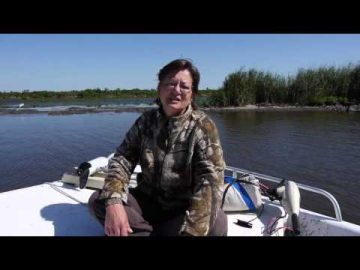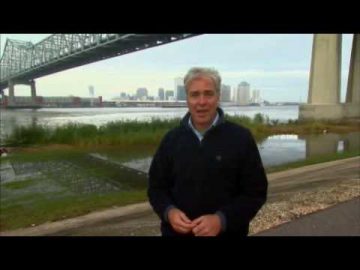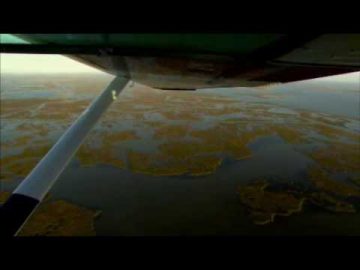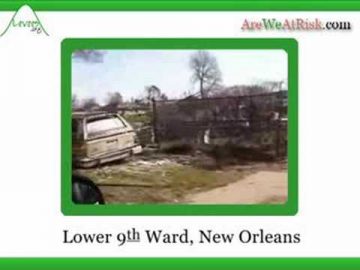
WGL initiative = save the Wetlands, save the Gators, save Louisiana! Because if we lose the first two, the third is already gone
Our mate, Louis Maistros performs “Go Down Water” (live at Octavia Books, Mar. 2009 – thanks to Louis Maistros & A City Of Friends for recording).
Visit Louis website to purchase copies o’ his excellent books including The Sound Of Building Coffins.
- From 1932 to 2010 Louisiana lost 1,868 square miles of coastal land – an area almost the size of the State of Delaware
- 10,000 miles of canals have been dredged in the Louisiana wetlands so far – longer than the lengths of the Amazon and Mississippi rivers combined
- Currently, Louisiana loses an average of 25 square miles of land every year – almost two football fields every 45-50 minutes. In the next five decades, the Louisiana coast is expected to lose a further 700 square miles – more than the area of Lake Pontchartrainand much of this land will be closer to populated areas and more important as a buffer to protect them.
- USGS and other studies indicate that major shifts in the course of the Mississippi River have contributed significantly to the demise of the wetlands.
- Human activities during the past century have drastically affected the wetlands.
- Methods to mitigate wetlands loss are costly and politically sensitive, affecting communities, agriculture, and industry.
Read more information on the Wetlands and why they need help…
Gulf Restoration Network / Gulf Restoration Network YouTube Channel
USGS Fact Sheet: Louisiana Coastal Wetlands
Some of Louisiana’s great wildlife reserves:
Jean Lafitte National Historic Park & Preserve
Atchafalaya National Heritage Area
Alligator Bayou (A full-throttle environmental battle was lost in what’s left of an ancient cypress-tupelo swamp just southeast of Baton Rouge, Louisiana. Politicians and corporate mitigation bank owners banded together in Iberville Parish, west of Baton Rouge, and succeeded in emptying the 13,000-acre Spanish Lake Basin as if it were nothing more than a toilet.)
Wikipedia List Of National Wildlife Refuges (Louisiana)
More Links:
Barataria-Terrebonne National Estuary Program – a partnership of government, business, scientists, conservation organizations, agricultural interests, and individuals for the preservation, protection, and restoration of the Barataria-Terrebonne National Estuary in southeast Louisiana.
Bayou Woman – our mate, Captain Wendy Billiot lives, works & raises her family in the Bayous of South Louisiana. She has written excellent Children’s books (Before The Saltwater Came, Regret The Egret), provides Wetland Eco Tours & fishing charters of local wetlands, speaks around the country and works closely with BTNEP and other local agencies in restoring and preserving the natural heritage of Louisiana. You would be hard pressed to find a better guide in the Louisiana Wetlands.
Louisiana Green Corps – (LA Green Corps) is a green job skills training program for 17-24 year old youth living in the Greater New Orleans Area. A collaborative partnership comprised of three New Orleans based non-profit organizations, trains youth in green job skills while helping them gain work adjustment skills, overcome social obstacles, secure a job, and identify resources to help them become successful, contributing members of the workforce. Ecologically sound restoration and revitalization projects prepare Corps members for entry into emerging green industries while galvanizing the local economy through the development of social enterprises. These enterprises create economic opportunity while meeting social and environmental needs.
Levees.org – Based in Louisiana. Chapters in Illinois, Florida, Oregon, New York, Texas, and California
Swamp School (Wetland & Environmental Education)









